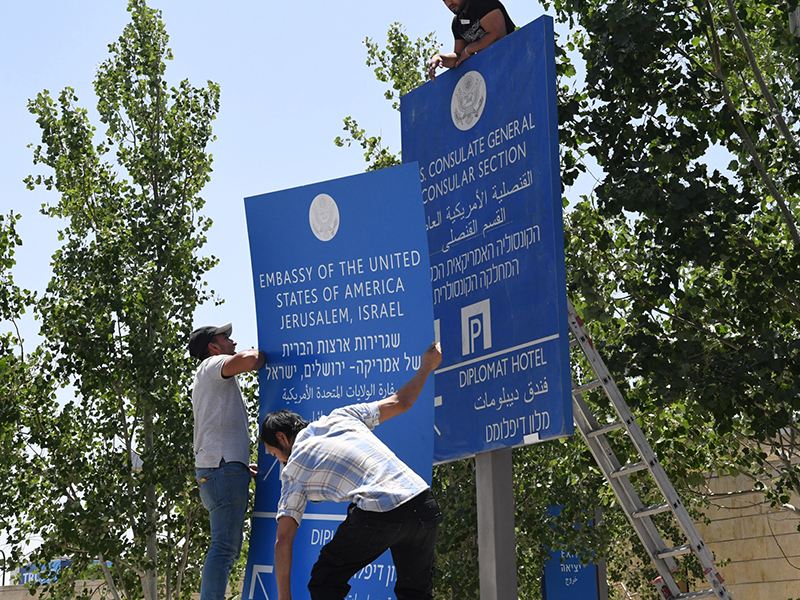Canada’s diplomats were invited to one of the ceremonies marking the opening of the new American Embassy in Jerusalem, but did not attend.
Deborah Lyons, this country’s ambassador to Israel, was back in Canada when ceremonies were held for the opening of the U.S. Embassy on May 13 and 14.
Her second-in-command, Deputy Head of Mission Anthony Hinton, was in Israel at the time, but did not attend the festivities.
There has been some confusion around Canada’s attendance at the opening. That’s because there were two ceremonies. The one on Monday, May 14, saw Ivanka Trump, the U.S. president’s daughter, and U.S. Treasury Secretary Steven Mnuchin unveil the new embassy’s dedication plaque in the presence of Israeli President Reuven Rivlin and Prime Minister Benjamin Netanyahu. Canada was absent because it wasn’t invited.
The opening of the embassy was “a bilateral ceremony between Israel and the United States. As such, Canada did not receive an invitation to attend (that) event,” Brianne Maxwell, a spokesperson for Global Affairs Canada, told The CJN.
However, there was another ceremony the evening before the unveiling, which was hosted by Israel’s foreign ministry. Envoys from 86 countries were invited and 33 African, Latin American, European and a few Asian diplomats said they would attend.
The Israeli Embassy in Ottawa confirmed that the Canadian Embassy had been invited to that event.
Lyons was absent because she “had long-booked travel to Canada to do outreach on behalf of the government and thus was outside of Israel (at the time),” Global Affairs spokesperson Brittany Venhola-Fletcher explained.
As well, the May 13 event took place on Yom Yerushalayim, “a day related to the occupation of land by Israel in 1967. As you know, Canada’s longstanding position is that the status of Jerusalem can be resolved only as part of a general settlement of the Palestinian-Israeli dispute and therefore it does not celebrate Jerusalem Day,” stated Ada Stern, a spokesperson for Canada’s Embassy in Israel.
Canada’s absence at the event “was pretty glaring,” said Aurel Braun, a political science professor at the University of Toronto. “Canada made a deliberate decision to disregard this and I think it was very unfortunate because we are supposed to be, at least the government says, good friends of Israel. This was a chance to demonstrate that.”
He said Canada’s unwillingness to move its embassy to Jerusalem was not a reason to avoid the event. Braun noted that most of the countries that attended have not moved their embassies and have no intention of doing so.
He also said he believes the absence of Canadian diplomats at the opening signals “an important, even if subtle, change in policy” on Israel between the previous Conservative government and the current Liberal one.
Envoys from 11 African nations attended the opening: Angola, Cameroon, Republic of the Congo, Democratic Republic of Congo, Ivory Coast, Ethiopia, Kenya, Rwanda, South Sudan, Tanzania, and Zambia. Nigeria indicated it would attend but did not.
Seven ambassadors from Latin America confirmed their attendance: Paraguay, Guatemala, the Dominican Republic, El Salvador, Honduras, Peru and Panama. (Guatemala opened its embassy in Jerusalem on May 16; Paraguay is scheduled to relocate its mission later this month.)
A number of European countries were also represented: Albania, Georgia, Ukraine, Czech Republic, Hungary, Romania, Macedonia and Serbia. Austria was the only western European country to send its ambassador.
The remaining envoys were from Myanmar and the Philippines. Diplomats from Thailand and Vietnam indicated they would come but did not.
“Notably absent from the list are some of Israel’s allies and staunchest friends, such as Canada, Australia and Germany,” the Times of Israel pointed out.
It said that China, Russia, Argentina and India were boycotting the event.
Renan Levine, who also teaches political science at U of T, cited a different reason for Canada’s absence.
Given that opening the U.S. embassy in contested Jerusalem “was in direct violation of UN Security Council resolutions (and) Canada’s long-standing support for such resolutions, I would not imagine Canada participating,” Levine said.
He said the countries that did take part are “currying favour” with the United States.
In a Facebook post that was widely circulated, the Canada-Israel Friendship Association accused Prime Minister Justin Trudeau of having “instructed the Canadian ambassador to Israel to boycott the opening of the U.S. Embassy.”
The CJN’s messages to the group were not returned.
The Palestinian delegation in Ottawa welcomed the decision of Canada and other governments that didn’t participate in “the so-called inauguration ceremony of the U.S. Embassy on the Palestinian land.”
A previous version of this article misstated the name of the deputy head of mission of the Canadian Embassy in Tel Aviv, and mistakenly said he was in Canada at the time the U.S. Embassy was opened in Jerusalem. As well, the Canada-Israel Friendship Association says it did reply to The CJN’s request for comment, in a timely manner (The CJN did not receive the reply until after deadline). In its response, the association referred to a Times of Israel story, which included Canada among those countries that were “boycotting” the opening of the U.S. Embassy.
